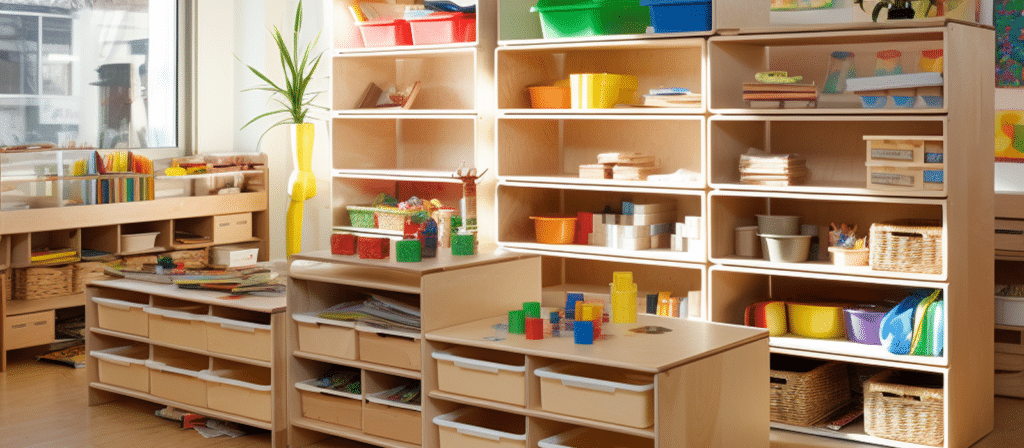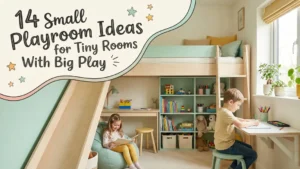In our pursuit of health-conscious environments, we have inadvertently stripped away the cozy essence from our Early Care and Education (ECE) settings. While prioritizing health is commendable, confining children and adults to sterile spaces devoid of plush, snug spots is akin to institutionalization. These soft elements, akin to a warm hug from home, infuse an environment with a homely feel. They grant us the liberty to step away from the crowd, to relish solitude or engage in intimate discussions with companions. Amidst the hustle, both children and adults require occasional respites and secure vantage points to observe the world around them. This discourse lays out the case for reintroducing soft, snug spaces and also offers insights into their upkeep.
Rediscovering Soft Elegance
Let’s begin by delving into the essence of these soft elements. I ardently advocate for sofas, ottomans, and generous, soft chairs accommodating adults and 2-3 children. Plush cushions, foam mats, and cocooning hammocks find their place in reading corners and cozy alcoves that can be conjured up in most ECE setups. Allocating spaces for adult seating across the room not only elevates staff morale but also beckons parents to witness their child’s playful escapades. Window benches embellished with cushions present a perfect setting for both adults and children. If designed with removable covers, they metamorphose into convenient and much-needed storage. Lofts extend vigorous play above and sheltered, snug corners beneath. A short bookshelf or an open cabinet sans doors can be tailored into a cozy retreat for children. Even a kiddie pool lined with cushions can form an enchanting enclave of tranquility. Innovation knows no bounds.
Beyond Furniture: The Canvas of Softness
The concept of softness stretches beyond furnishings to encompass walls and ceilings. Awnings, canopies, and tents gently filter ambient light, imbuing spaces with a soothing glow. Banners act as visual guides, demarcating various activities. Quilts adorning walls infuse spaces with color, rendering warmth and a sense of containment, all the while mitigating noise—a substantial concern in childcare settings. Simplicity should underscore both the color palette and decorative elements. Clashing patterns and hues can be distressing to the eye, leading to overstimulation for children and adults alike. Yet, it’s noteworthy that vibrant colors seamlessly integrate in Latin American and African American programs, reflecting the cultural fabric of the community.
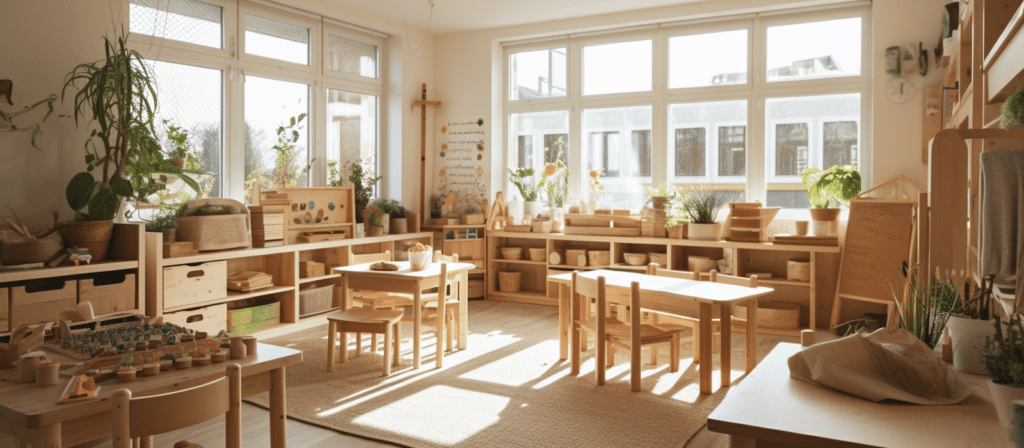
Nature’s Embrace: Softness in Greenery
Let’s not disregard the potential of indoor and outdoor plants. Not only do they exemplify growth and change, but they also elevate air quality within spaces, contributing to our holistic well-being. Their mere presence exudes a serene charm.
Defining Soft Elements in Practice
A functional interpretation of soft elements encompasses:
- Cozy seating for children and adults within designated quiet zones.
- Adult seating in dining areas, at the room entrance, and strategically interspersed.
- Welcoming havens that exude containment and comfort.
- Soft visual elements that delineate spaces while dampening noise.
- Plants as living companions that purify indoor air and soothe the soul.
Incorporating Softness: Practical Unveilings
Let’s pivot to the tangible integration of these soft elements and their enrichment of our early care and education ethos and curriculum. Distinguished programs champion family participation, which commences by ensuring seamless transitions at the start and end of each day. Considering that most parents rush to work, expecting them to perch on the floor or hunch onto child-sized chairs is unrealistic. A sofa, a chair, or even a generous ottoman positioned near the entrance extends a warm embrace, enticing parents to share a moment with their little ones. Age-appropriate books thoughtfully placed within reach facilitate a serene prelude to parting ways. At day’s end, such spots become a haven for parents grappling with a fussy child. Their reluctance to leave often stems from a desire to join in their child’s daily escapades. Moreover, adult seating isn’t solely functional—it catalyzes effortless parent-child interaction, as evidenced by this anecdote:
A weary mother, brimming with exhaustion, enters at day’s close. Her vivacious four-year-old embarks on a spirited spree of climbing and sliding. Gazing at her energetic child, she lingers by the door, weariness etched across her face. This scenario is commonplace, and teachers aspire to alleviate such separation tensions. A swift intervention takes place—an adult chair materializes near the slide’s base, beckoning the mother to sit. With proximity comes serenity. The child’s exuberance gradually ebbs, and within moments, she nestles into her mother’s lap with a book. Conflict-free, they leave together, the chair having fostered the transition from communal to familial space.
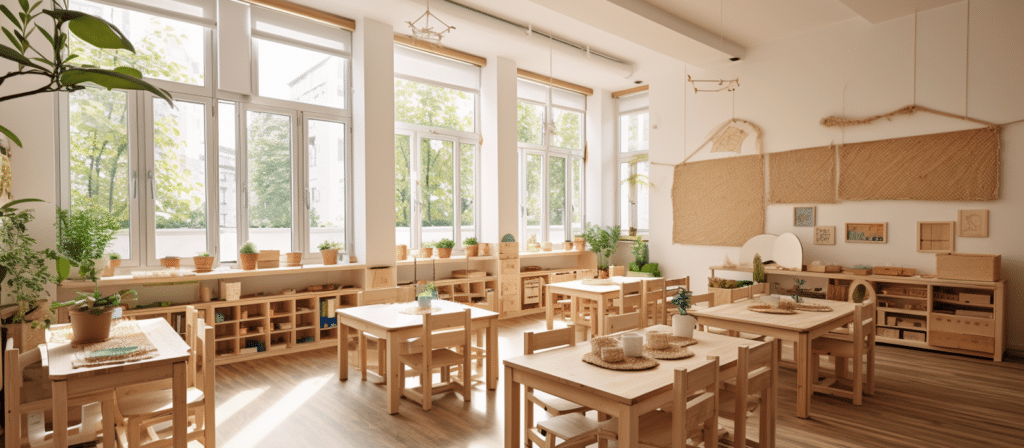
Soft Comforts: Fostering Bonds
Undoubtedly, fostering robust, trusting bonds between teachers and children is paramount. An adult’s perch on a chair, ottoman, window seat, or hammock extends an invitation to engage with children, be it through observation, conversation, or offering solace. Dining zones mandate adult seating for individualized feeding and supportive interaction. A glider, with its magical sway, lulls restless children into naptime serenity. Prolonged periods of standing can be taxing, with adults often stooping to connect with children—an ergonomic hazard. Comfortable seating encourages face-to-face exchanges that sow the seeds of trust, while concurrently safeguarding educators’ physical well-being.
Nurturing Healthier Spaces
Group dynamics can be overwhelming for both children and adults. The cacophony, air pollutants, and harsh lighting endemic to such setups take a toll. Enter soft elements, poised to mitigate these challenges. Clinical, glaring overhead lights, though cost-effective, escalate stress and headaches. Considering how frequently young eyes look upwards, the risk to ocular health is evident. Noise pollution in ECE spaces has been linked to hearing impairment. Noise begets more noise; louder children demand louder educators. Rugs, wall hangings, and cushions function as sound absorbers. Soft additions—awnings, canopies, tents—counteract the glare of overhead lighting while muffling noise. Their collective presence bestows a harmonious, healthier group experience.
Havens of Solace: Taming the Bustle
Establishing pockets of serenity within bustling environments is instrumental. The comforting aura of home reassures children, teachers, and parents alike. Window seats double as perches for reflection or panoramic observations. For a young toddler, they serve as anchors during precarious attempts at standing. Vinyl-coated mats offer versatile seating both indoors and out, moonlighting as tumbling spaces.
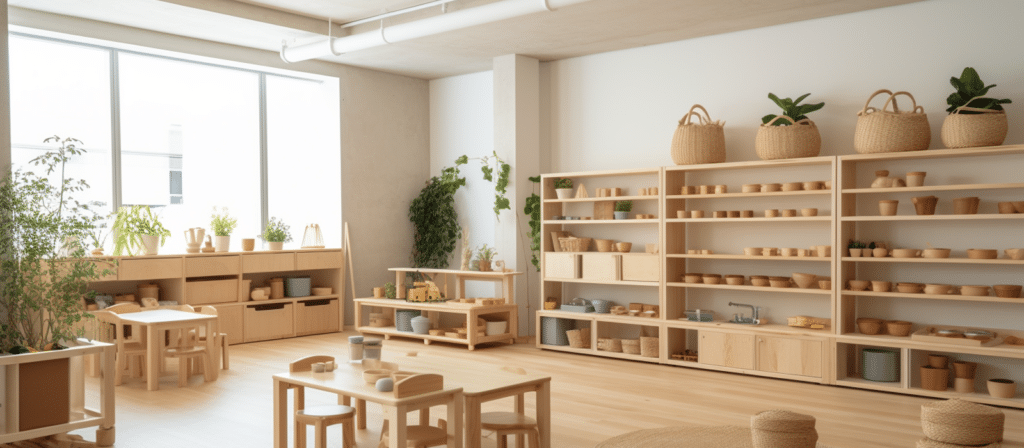
Softness and Serenity: A Clean Affair
Cleaning soft elements is often used as a deterrent, preventing their incorporation in classrooms. However, fabrics like washable sheets, coverlets, and throws can enshroud couches, chairs, and foam mats. Parachute fabric, a stalwart for creating tents and canopies, requires minimal washing and periodic dusting. Ceiling fixtures demand scrutiny, with state regulations and fire codes influencing their use. Removable, washable cushions are a practical choice. Fabrics can be treated to resist stains and facilitate sponge cleaning. Note that many cleaning and stain-guard products are toxic, necessitating thorough aeration before reintroduction into the classroom. Plants, a simple inclusion, require only regular dusting.
Conclusion
The advantages of incorporating soft elements within ECE spaces far outweigh the maintenance challenges they pose. These elements extend tailored support to both children and adults, offering inviting, quiet domains. They effectively address noise and lighting concerns while enhancing the overall quality of group care. The appeal lies not just in aesthetics, but in the fostering of relationships and the creation of nurturing environments. So, let us not shy away from weaving comfort into the tapestry of Early Care and Education settings, rendering them as familiar and inviting as the warm embrace of home.

